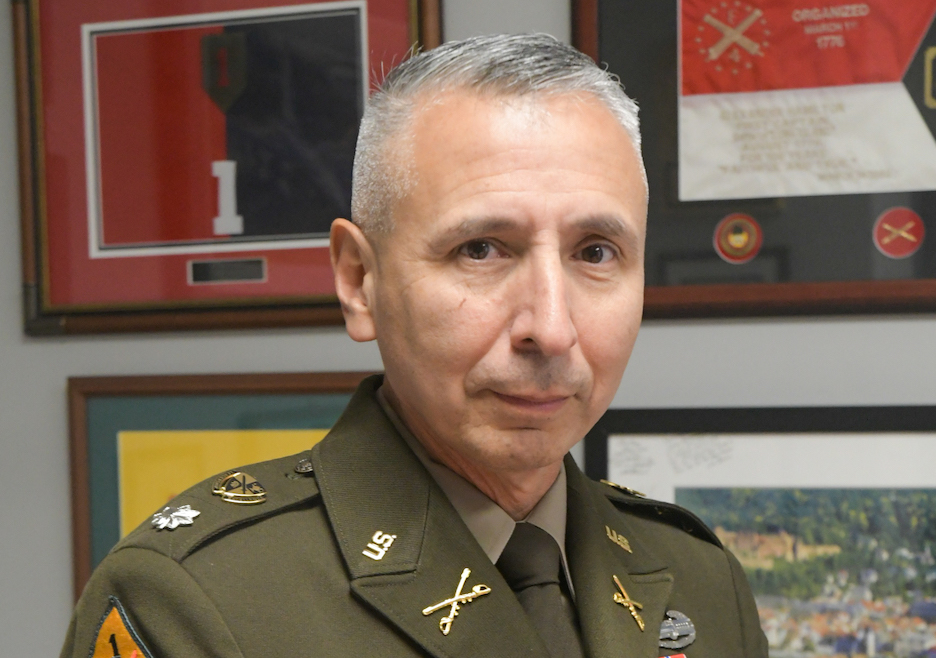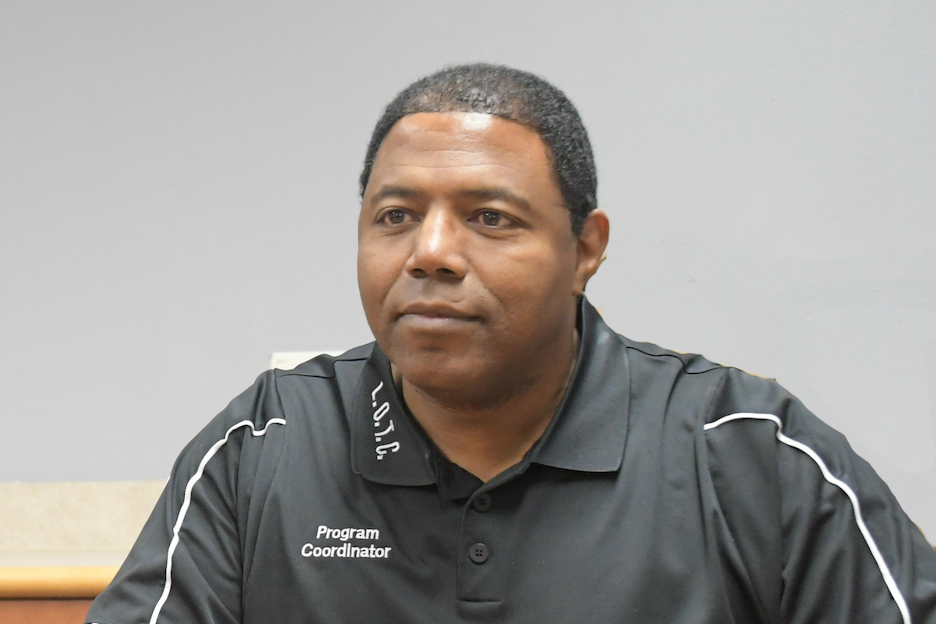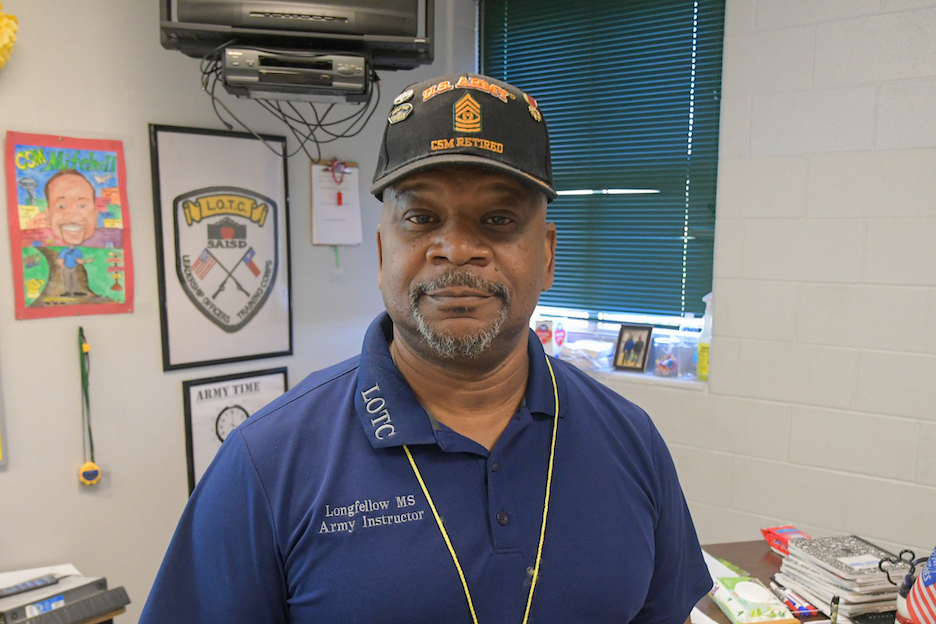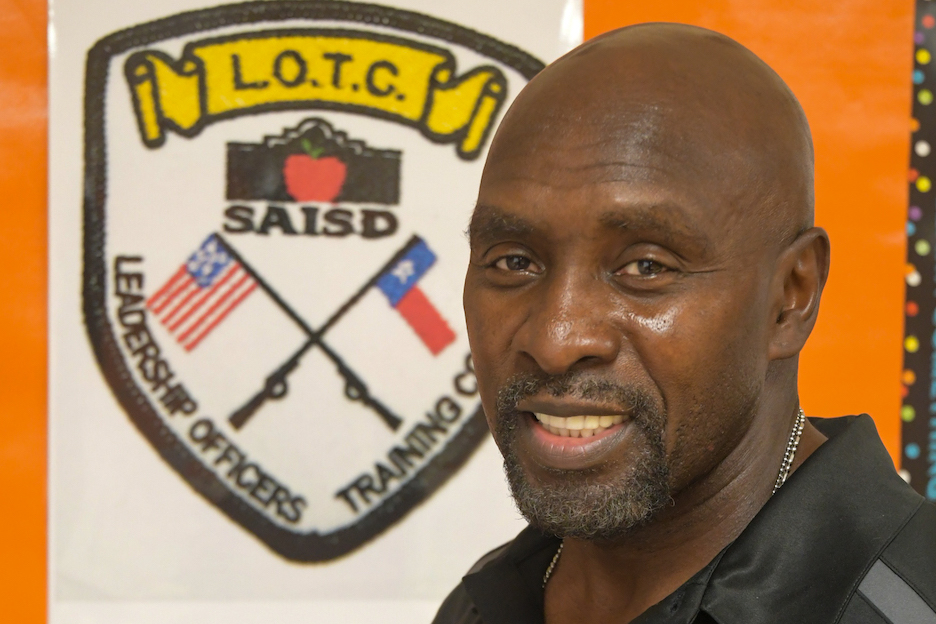This Veterans Day, we present to you the stories of some of our veterans who lead our JROTC and LOTC programs in the district. We thank them not only for their service to our country, but also to our students, as they mentor and inspire them daily to use critical thinking, self-discipline, accept responsibility, and exemplify good citizenship. We know the hours are long as they prepare for competitions and inspections and spend many extra hours tutoring and listening with the perspective of servant leaders who have seen so much.
Read more about their experiences here:
 Retired Lieutenant Colonel Santiago Bueno is a “senior” at Lanier High School this year.
Retired Lieutenant Colonel Santiago Bueno is a “senior” at Lanier High School this year.
The San Antonio native retired from the Army with more than 21 years of military service and knew he wanted to teach. He’s now in his fourth year as a JROTC instructor at Lanier.
Bueno shares with the cadets in the program wisdom earned from a storied military career, one which took him from being a Tank Platoon Leader to the Pentagon as a Secretary of Defense Intern just months before the 9/11 terrorist attacks.
As an intern, Bueno spent time in Africa with Office of African Affairs. For three years he traveled back and forth to Africa as he worked to help establish the borders of Sudan and South Sudan. He and his family lived together in Germany for a few years as well.
Bueno also worked at Joint Task Force North, which protects U.S. borders from transnational threats. He was responsible for the border from Texas and New Mexico all the way up to Virginia and south to include the Virgin Islands, Puerto Rico, and U.S. territories in those waters.
He caught the teaching bug at North Dakota State University, where he was a professor of military science for three years. Now in his ninth year teaching at the high school level, he finds himself bringing lessons from his military career to students just a few miles away from where he spent his formative years in the Edgewood ISD.
He encourages the cadets to try new things even if they aren’t sure that they will excel at them.
“In order to find what you’re good at, you have to try new and sometimes scary things,” he said. “It is okay to fail; in fact, fail often, but learn and don’t make the same mistake twice.”
In his four years at Lanier, the JROTC program has built a Confidence Course, which allows cadets to train for raider competitions, and earned an exclusive spot in the Cyber Pilot program — one of only 10 programs in the nation.
Bueno works to ensure that through Lanier’s JROTC program, cadets learn discipline, attention to detail, and confidence. Together, they create goals and celebrate achievements as the program prepares students for their next steps in life.
"High school should be a stepping stone to where you are going to end up,” Bueno said. “That’s why we push our cadets to look at college and/or trade schools, and if a student wants to join the military, we will help them achieve their goals in life.”
---
 Major James King is quick to share that he has the privilege of running the most dynamic program in the district.
Major James King is quick to share that he has the privilege of running the most dynamic program in the district.
As the district’s LOTC coordinator, he oversees 15 programs which support more than 2,000 students.
Before this role, he spent 22 active years in the Army. He started out as a private working as military police. He then went to officer candidate school.
“As an officer, I fell into the maintenance world and eventually became a logistician because of my military education and training,” King said. “I’m what’s called the 90 Alpha. I plan and manage military operations, including maintenance, training, medical service, aviation, and supply. No matter where the operation is, I can have people, equipment, money moving to where it needs to be around the globe.”
King has degrees in computer information and science, business administration and human resource development.
With his background in computers and human resource development, King also worked in the private sector, repairing systems for State Farm Insurance. After retiring from the Army, he got into education by substitute teaching at Sam Houston High School. He took a position as the LOTC instructor at Wheatley Middle School and started the program at the Young Men’s Leadership Academy. He has formally served as the district coordinator since April.
The development of problem-solving skills is one of the primary goals that King says he and LOTC instructors have for their students.
“We teach them, ‘before you fall apart, start thinking,’” King said. "'It may seem bad at the moment, and it may be, but the sooner you start thinking, the sooner you will solve it.’”
King says he appreciates the diverse backgrounds of all the LOTC instructors, which contribute to the strengths of the district’s program.
“We are all multi-degreed; we have more than one job skill,” King said. “We all have different backgrounds but we all have the same goal — to enhance our kids.”
The LOTC programs feature STEM components including cybersecurity and drones, but also help students with life skills including personal finance and how to apply for college. All the while, they provide cross-curricular support for core classes. The flexible curriculum is part of why King says the program appeals to many different types of students.
“Our program is a home for everybody,” King said. “Anybody on campus — you fit into LOTC. All kids, no matter their background, we have a home for them.”
---
 For Command Sergeant Major Roosevelt Mitchell, a highlight of his military career was taking 1,600 soldiers into combat and bringing them all back to their families.
For Command Sergeant Major Roosevelt Mitchell, a highlight of his military career was taking 1,600 soldiers into combat and bringing them all back to their families.
An LOTC instructor at Longfellow Middle School, Mitchell retired from Brooke Army Medical Center in 2012 after serving as a combat medic and EMT.
“That’s what I love to do,” Mitchell said. “I used to work in emergency rooms.”
Stationed in Germany, Hawaii, Korea, Japan, and all over the United States, Mitchell said one of the best parts was being able to mentor soldiers. So when he retired, he decided to give back by teaching. He taught JROTC in Los Angeles, California, before working at Longfellow the last two years.
“I try to instill in my students self-discipline and critical thinking skills—things that will benefit them throughout life, not just in the classroom but outside this classroom,” Mitchell said.
He teaches about 75-80 sixth and seventh graders each day. The first in his family to graduate high school, Mitchell reminds his students of the opportunities that are out there with education.
“I tell them that you don’t have to settle for what you are now, you can always become what you want to be in the future,” he said.
---
 Command Sergeant Major Frankie Woods believes in the power of education.
Command Sergeant Major Frankie Woods believes in the power of education.
“When I came up, when I was young, I came from a poor family, but a hard-working family,” Woods said. “I know what it was like to work hard. I joined the military after high school because I couldn’t afford to go to college at the time.”
In the years since, Woods, now an LOTC instructor at Poe Middle School, has received an associate degree in business, a bachelor of science degree in aviation operation management, and a master of business administration in human resource management, in addition to more than a dozen noncommissioned officers’ courses. But most importantly, he has devoted his life to bringing educational opportunities to others.
Woods entered the United States Army in January 1981 at Fort Jackson, South Carolina. He completed Basic Training and Advance Individual Training at Fort Rucker, Alabama, where he completed the Air Traffic Control and Flight Operation Specialist Course. During his 31 years in the Army, Woods completed many deployments, including tours in Iraq, Afghanistan, Kosovo, and Saudi Arabia.
In his war-time deployments, he had many memorable moments alongside and supporting his soldiers.
“While serving in Iraq, four of our aircrafts went down,” Woods said. “All soldiers were rescued from the mission. We promised the families we would not leave any soldier behind. My biggest accomplishment was every soldier was brought home.”
Woods served in every aviation leadership position from Squad Leader to Brigade Command Sergeant Major.
As Brigade Command Sergeant Major at Fort Hood, Woods saw a need. The soldiers were interested in furthering their education, but some couldn’t travel to the college off base.
“I got with the education center because I wanted to see if the local college would work with me to come to my brigade and set up classes for my kids to go to college,” Woods said.
At first they told him no, but he persisted. Once the program was approved, for the next three years, Woods saw amazing results.
“During those three years, we had 982 soldiers that went through that program,” Woods said. “Three hundred forty-two got an associate degree, 287 got a bachelor’s degree, and five got master’s degrees in aviation. Even though I wasn’t able to get an education when I got out of high school, I made sure my soldiers could. Throughout my career I continued to do that because I know how important it is.”
He served as a CSM for 14 years. Now retired from the Army, Woods teaches with that same passion at Poe. Feeling called to the position, Woods spends every day putting his energy into developing tomorrow’s leaders, serving as not only LOTC instructor but also basketball and football coach.
“I’m here because it’s where I’m supposed to be,” Woods said. “To come here and be with these kids is just unbelievable. Every day I just love it.”
He’ll stop and listen to any student who talks to him, whether it is one of the 145 students on his rolls, or a student he passes in the hall.
“These kids come in here at school, and first and foremost, what I want to do is make sure that they understand that we do care,” Woods said. “I try my best to make sure they are taken care of, and make sure they are learning, and let them know how important education is.”
He believes in cultivating student leadership, trusting his student leaders to set the pace of class and lead the classroom activities. He has a group of students who complete flag detail every day as well with minimal supervision.
“I feel confident that my leaders can do it and they have,” Woods said. “Leadership is important, and I think the more that we instill that into young kids, our cadets, they’re going to be role models for others. They are going to be our future, so we have to invest in them.”
---
Este Día de los Veteranos les presentamos las historias de algunos de nuestros veteranos que dirigen nuestros programas de JROTC y LOTC del distrito. Les agradecemos no solo por su servicio a nuestro país, sino que también a nuestros estudiantes ya que los asesoran y los inspiran cada día a usar el pensamiento crítico, la autodisciplina, a aceptar la responsabilidad y a ejemplificar la buena ciudadanía. Sabemos que el horario es exigente a medida que se preparan para las competencias y las inspecciones, y que pasan muchas horas extra ofreciendo tutoría y escuchando con la perspectiva de líderes servidores que han visto tantas cosas.
Lea más sobre sus experiencias aquí:

El Teniente Coronel Jubilado Santiago Bueno lleva cuatro años como instructor de JROTC en Lanier High School.
Él originario de San Antonio se jubiló del Ejército con más de 21 años de servicio militar y sabía que quería enseñar.
Bueno comparte con los cadetes la sabiduría que desarrolló gracias a su trayectoria militar. Por ejemplo, tuvo la oportunidad de trabajar como Pasante del Secretario de Defensa en el Pentágono solo meses antes de los atentados terroristas del 11 de septiembre.
Pasó tiempo en África con Asuntos Africanos. Por tres años viajó a África a medida que trabajó para ayudar a establecer los límites geográficos de Sudán y Sudán del Sur. Él y su familia también vivieron en Alemania por unos años.
Bueno también trabajó con Joint Task Force North, que protege a las fronteras de los EE. UU. contra amenazas transnacionales y monitoriza la frontera desde Texas y Nuevo México hasta Virginia (incluso las Islas Vírgenes, Puerto Rico y los territorios de EE. UU. en esas aguas).
Comenzó su carrera en la educación en North Dakota State University, donde fue profesor de ciencias militares por tres años. Ahora lleva nueve años enseñando al nivel de preparatoria e incorpora las lecciones de su carrera militar a lo que les enseña a los estudiantes a solo unas cuantas millas de donde él creció en Edgewood ISD.
Él anima a los cadetes a que prueben cosas nuevas incluso si no están seguros si lo harán a un nivel avanzado.
“A fin de encontrar tus fortalezas, tienes que probar cosas distintas”, dijo él. “Comete errores a menudo, pero aprende y no cometas el mismo error dos veces”.
En los cuatro años que lleva en Lanier, el programa de JROTC ha desarrollado la Pista de Confianza, la cual les permite a los cadetes entrenar para los concursos raider, y recibió un puesto exclusivo en el programa Piloto de Informática — uno de solo 10 programas en el país.
Bueno trabaja para asegurarse de que a través del programa de JROTC de Lanier los cadetes aprendan disciplina, atención al detalle y confianza. Juntos crean metas y celebran logros a medida que el programa prepara a los estudiantes para sus siguientes pasos.
"La escuela preparatoria debería ser un punto de partida para el futuro”, dijo Bueno. “Por eso es que los animamos a que asistan a la universidad o a un programa vocacional, y si un estudiante quiere alistarse en el servicio militar, los ayudaremos”.
---

El Comandante James King comparte que él ha tenido el privilegio de administrar el programa más dinámico en el distrito.
Como coordinador de LOTC del distrito él supervisa 15 programas que apoyan a más de 2,000 estudiantes.
Antes de este puesto, pasó 22 años activos en el ejército. Comenzó como un soldado raso trabajando como policía militar.
Entonces asistió a la Escuela de Aspirantes a Oficial.
“Como oficial entré al mundo de mantenimiento y después me convertí en experto en logística debido a mi educación y capacitación militar”, dijo King. “Soy lo que se conoce como 90 Alpha. Planifico y administro las operaciones militares, incluso el mantenimiento, la capacitación, el servicio médico, la aviación y el suministro. Sin importar dónde se esté llevando a cabo la operación, puedo tener a las personas el equipo y el dinero que se necesita en cualquier parte del mundo”.
King tiene títulos en informática, administración de empresas y desarrollo de recursos humanos.
Con su experiencia informática y de desarrollo de recursos humanos, King también trabajó en el sector privado reparando sistemas para State Farm Insurance. Después de jubilarse del Ejército, empezó a trabajar en la educación como maestro sustituto en Sam Houston High School. Aceptó el puesto de instructor LOTC en Wheatley Middle School y comenzó el programa en Young Men’s Leadership Academy. Ha servido como el coordinador del distrito desde abril.
El desarrollo de las habilidades de solución de problemas es una de las metas principales que King indica que él y los demás instructores LOTC tienen para sus estudiantes.
“Les enseñamos que ‘antes de derrumbarse, deben ponerse a pensar’”, dijo King. "'Puede parecer difícil en ese momento, y es posible que lo sea, pero entre más pronto se pongan a pensar, más pronto lo resolverán’”.
King dice que aprecia las experiencias diversas de todos los instructores LOTC, los cuales aportan a las fortalezas del programa del distrito.
“Todos tenemos más de un título; tenemos más que solo una habilidad laboral”, dijo King. “Todos hemos tenido experiencias diferentes, pero tenemos la misma meta, ayudar a nuestros niños a mejorar”.
Los programas LOTC cuentan con componentes STEM que incluyen seguridad cibernética y drones, pero también ayudan a los estudiantes con habilidades para la vida, incluso las finanzas personales y cómo solicitar para la universidad. Y al mismo tiempo proporcionan apoyo interdisciplinario para las materias principales. King indica que el currículo flexible es parte de por qué el programa atrae a tantos tipos de estudiantes diferentes.
“Nuestro programa les da la bienvenida a todos”, dijo King. “Cualquier estudiante de la escuela. — tienen un lugar en LOTC. Todos los estudiantes, sin importar su origen, este puede ser su hogar”.
---
 Para el Sargento Mayor al Mando Roosevelt Mitchell, un punto culminante de su carrera militar fue llevar a 1600 soldados al combate y traerlos todos de regreso a sus familias.
Para el Sargento Mayor al Mando Roosevelt Mitchell, un punto culminante de su carrera militar fue llevar a 1600 soldados al combate y traerlos todos de regreso a sus familias.
Mitchell, quien es un instructor de LOTC en Longfellow Middle School, se jubiló del Brooke Army Medical Center en 2012 después de prestar servicio como médico de combate y técnico médico de emergencias.
“Es lo que me encanta hacer”, dijo Mitchell. “Antes trabajaba en salas de emergencia”.
Mitchell estuvo apostado en Alemania, Hawái, Corea, Japón y en varias partes de Estados Unidos, e indica que una de las mejores partes fue poder asesorar a los soldados. Así que al jubilarse decidió enseñar para contribuir. Enseñó JROTC en Los Ángeles, California, antes de comenzar a trabajar en Longfellow por los últimos dos años.
“Procuro infundir habilidades de autodisciplina y pensamiento crítico en mis estudiantes, algo que los beneficiará a lo largo de sus vidas, no solo en el salón, sino que también fuera”, dijo Mitchell.
Él enseña alrededor de 75-80 estudiantes de sexto y séptimo grado cada día. Mitchell fue el primero de su familia en graduarse de la preparatoria y les recuerda a sus estudiantes de las oportunidades que están disponible scon una educación.
“Les digo que no tienen por qué limitarse a la situación en la que están ahora, siempre pueden llegar a ser lo que ellos quieran en el futuro”, dijo.
---
 El Sargento Mayor al Mando Frankie Woods cree en el poder de la educación.
El Sargento Mayor al Mando Frankie Woods cree en el poder de la educación.
“Desde pequeño crecí en una familia pobre, pero muy trabajadora”, dijo Woods. “Yo sé lo que significa el trabajo duro. Me alisté para el servicio militar después de la preparatoria porque no tenía los fondos para ir a la universidad en ese momento”.
Wood, quien ahora es un instructor de LOTC en Poe Middle School, ha recibido un título asociado en negocios, una licenciatura en la operación de aviación, una maestría en administración de empresas y de recursos humanos, y ha tomado más de una docena de cursos para suboficiales. Pero lo que es más importante, él ha dedicado su vida a traer oportunidades educativas a los demás.
Woods entró al Ejército de Estados Unidos en enero de 1981 en Fort Jackson, Carolina del Sur. Él completó la Formación Básica y la Formación Individual Avanzada en Fort Rucker, Alabama, donde completó el Curso de Control Aéreo y de Especialista en Operaciones de Vuelo. Durante sus 31 años en el ejército, Woods completó muchos despliegues, incluso periodos de servicio en Iraq, Afganistán, Kosovo y Arabia Saudita. Él ha prestado servicio en cada puesto de liderazgo de aviación desde Líder de Escuadrón a Sargento Mayor al Mando de Brigada.
Como Sargento Mayor al Mando de Brigada en Fort Hood, Woods vio una necesidad. Los soldados estaban interesados en continuar su educación, pero algunos no podían viajar a la universidad fuera de la base.
“Me puse en contacto con el centro de educación porque quería ver si la universidad local podría venir a mi brigada y ofrecer clases para que mis soldados fueran a la universidad”, dijo Woods.
En un principio la respuesta fue no, pero él persistió. Una vez que se aprobó el programa, Woods vio resultados maravillosos por los siguientes tres años.
“Durante esos tres años, 982 soldados aprovecharon ese programa”, dijo Woods. “342 recibieron un título asociado, 287 recibieron una licenciatura y cinco recibieron maestrías en aviación. A pesar de que yo no pude recibir una educación cuando me gradué de la preparatoria, me aseguré de que mis soldados sí pudieran. A lo largo de mi carrera seguí haciéndolo porque sé lo importante que es”.
Woods ya se ha jubilado del Ejército y enseña con esa misma pasión en Poe. Siente que ha sido llamado a ese puesto y pasa cada día empleando su energía para desarrollar los líderes de mañana.
“Estoy aquí porque es donde debo estar”, dijo Woods. “El poder venir y estar con estos niños cada día es increíble. Me encanta”.
Él se toma el tiempo de escuchar a cualquier estudiante que quiera platicar, ya sea uno de los 145 estudiantes en su lista o un estudiante que pase en el pasillo.
“Antes que nada, quiero que estos estudiantes entiendan al venir a la escuela que ellos son importantes para nosotros”, dijo Woods. “Me esfuerzo por asegurarme de que tengan lo que necesitan, de que estén aprendiendo y que sepan lo importante que es la educación”.
Él cree en cultivar el liderazgo estudiantil, en confiar en sus estudiantes líderes para establecer el ritmo de la clase y dirigir las actividades del salón. También tiene un grupo de estudiantes que se encargan de la bandera todos los días con mínima supervisión.
“Confío en que mis líderes pueden hacerlo, y lo han hecho”, dijo Woods. “El liderazgo es importante y siento que entre más se lo inculquemos a nuestros niños pequeños, a nuestros cadetes, van a ser ejemplos para seguir para los demás. Ellos son nuestro futuro y tenemos que invertir en ellos”.